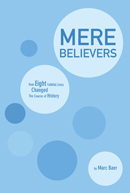
Mere Believers: How Eight Faithful Lives Changed the Course of History, Mark Baer. Eugene: Cascade Books, 2013.
Summary: Can individuals seeking to live faithfully to their calling change history? These profiles of eight British believers demonstrate that “mere believers” can indeed have a transformative influence in matters both of the heart and of the intellect.
Marc Baer, a professor of modern British history begins this book by narrating his own journey to faith during graduate school. And then he goes on to explain how and why he chose to write about the eight British figures profiled in this book (six individuals and a couple). Four he sees as those whose calling is a matter of the heart as they passionately gave themselves to causes of social justice and societal improvement. The latter four he identifies as those whose transformed intellect was employed in commending the Christian faith.
In the first group, he begins with Selina Hastings, the Countess of Huntingdon, whose calling is reflected in her philanthropy and her efforts to improve the quality of preaching through the formation of a preachers academy and her ongoing support of a number of these ministers. Then we have the former slave Olaudah Equiano, whose narrative of his life and speaking on behalf of abolition played a crucial role in the abolition of slavery in the British empire, in concert with the efforts of the next two individuals. Hannah More was a gifted playwright, who, in addition to her advocacy for abolition, wrote Village Politics, which may have dissuaded her people from following France down the path of revolution, a series of popular tracts promoting moral improvement and religious faith, and several books related to forming the character of young women. Finally, we have William Wilberforce, a rich and gifted young member of the House of Commons whose conversion leads to devoting his life to slavery’s abolition, as well as a variety of other social justice issues, in concert with his friends in the Clapham Sect.
The first persons we meet in the second group are Oswald and Biddy Chambers. Oswald thought he was called to a ministry in the arts, only to find himself called to the work of training others in Christian thought and discipleship. This eventually led to service as a World War 1 chaplain, and strangely, to his premature death. Biddy was a full partner in his work, joining him both in lectures and hospitality. After his death, she took his papers and edited them into a number of books, the most famous of which is My Utmost for His Highest, a devotional guide given to many young believers (I still have a copy given me by a mentor) that fuses keen intellectual and spiritual insight. G. K. Chesterton not only wrote prolifically as an apologist for Christian faith who could turn arguments on their head, but campaigned vigorously against eugenics, forestalling Britain from going down the road Germany pursued. Dorothy L. Sayers, left an ad agency to write, first murder mysteries, and then plays and even a theology of work, perhaps her signal contribution as she saw Christian faith freeing people not from work but to work with excellence.
What I appreciated about this work is that Baer has given us brief vignettes of eight truly interesting people. He doesn’t spare us their flaws, whether it be Hannah More’s temper, Oswald Chambers’ struggles with doubt and despair, Chesterton’s gluttony, or Sayers’ illegitimate child. He sets them in their time, narrates their conversion stories (all as adults) and their search for their callings. Then, rather than an exhaustive treatment of their lives, he focuses on a particular pattern of faithfulness to that call and its impact on society and history. The chapters conclude with a “text” illustrative of the person’s thought and questions for reflection.
This is a helpful book both for those wondering about the difference Christian faith makes, and for those seeking to discern their own calling. What is so helpful is that we have eight unique individuals of differing temperament, gifts, and social situations (from wealthy heiress to former slave), and both men and women. We see that no matter who we are, we may find a life of meaning and significance as we pursue the calling of “mere believers.”
Editor’s Note: Thank-you to Bob Trube for sharing his reviews with Emerging Scholars! Bob first posted the above review on Bob on Books. Some options of additional material to read on Mere Believers:
- Faithful Lives Change History: Book Review by Jennifer Woodruff Tait (The Well).
- Interview: Marc Baer on “Mere Believers” by Thomas B. Grosh IV (ESN Blog)
- Surrounded by “Mere Believers” by Thomas B. Grosh IV (ESN Blog)
~ Thomas B. Grosh IV, Associate Director, Emerging Scholars Network
Bob Trube is a former Associate Director of Faculty Ministry and Director of the Emerging Scholars Network. He blogs on books regularly at bobonbooks.com. He resides in Columbus, Ohio, with Marilyn and enjoys reading, gardening, choral singing, and plein air painting.

Leave a Reply